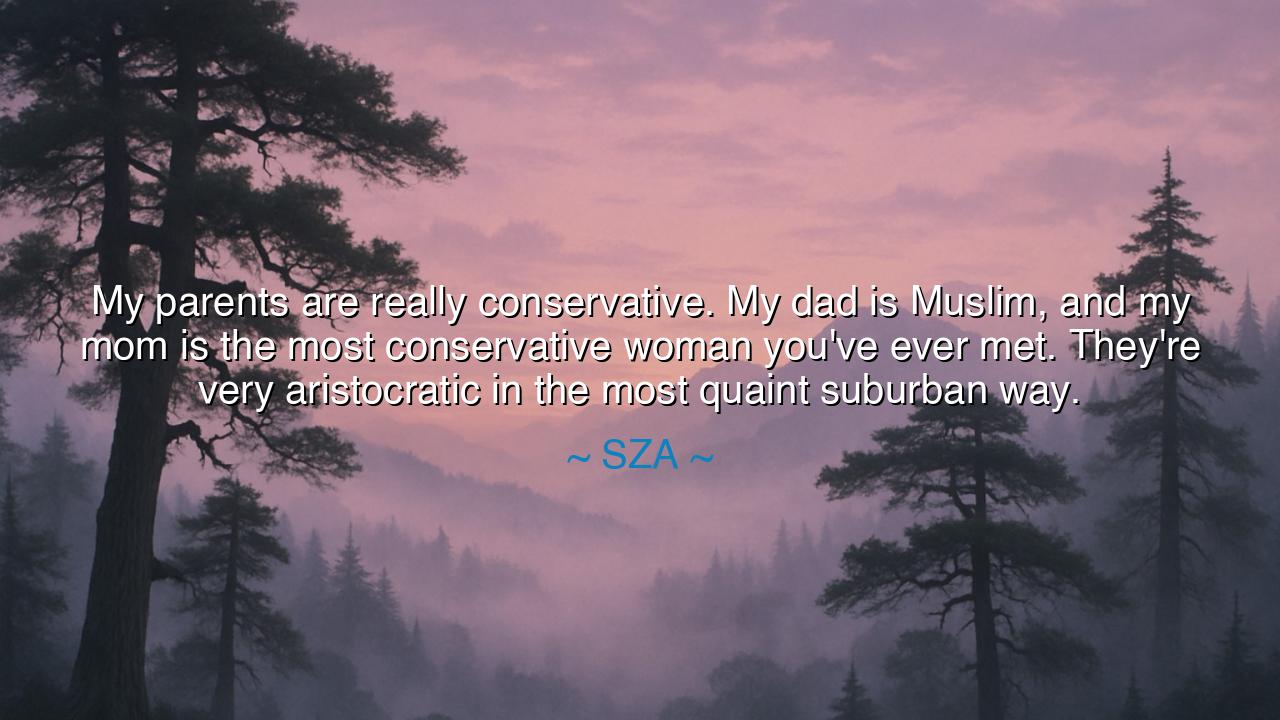
My parents are really conservative. My dad is Muslim, and my mom
My parents are really conservative. My dad is Muslim, and my mom is the most conservative woman you've ever met. They're very aristocratic in the most quaint suburban way.






When SZA spoke the words, “My parents are really conservative. My dad is Muslim, and my mom is the most conservative woman you’ve ever met. They’re very aristocratic in the most quaint suburban way,” she offered not only a glimpse into her upbringing, but a window into the eternal struggle between tradition and individuality, between the world we inherit and the world we must build for ourselves. Her tone is neither rebellious nor resentful; it is reverent, reflective, and deeply human. For within those words lies the ancient story of every child born into a house of order who learns to shape their own freedom while still honoring the roots that gave them life.
Her father’s faith, her mother’s conservatism, their quiet suburban dignity—all these forces formed the soil in which she grew. They represent the structure of values, the architecture of discipline, the sacred rules that give shape to the soul. And yet, as with all who are destined to create, SZA felt the pull of the unknown—the call to question, to wander, to find her own rhythm within the symphony of expectation. Her quote, then, is not a mere description of her parents, but a reflection on balance: the delicate dance between respecting the past and reaching toward one’s own light.
The ancients knew this dance well. In the temples of Greece, the youth were taught to honor their fathers and mothers, but also to seek their arete—their excellence, their unique gift to the world. The Buddha himself was born a prince, raised in a palace of luxury and moral restraint, yet left it all behind in search of truth. In his journey we see SZA’s meaning reflected: that tradition is the cradle, but not the cage, of the spirit. To grow, one must sometimes step beyond the walls built in love, not to destroy them, but to understand them more deeply.
Her description of her parents as “aristocratic in the most quaint suburban way” reveals a world of refinement—one not of wealth or grandeur, but of quiet pride, structure, and modest dignity. Such a household carries an unspoken code: to be proper, to be disciplined, to live according to what is “right.” And yet, within that environment, the artist’s soul often stirs with yearning. SZA’s music, rich with emotion, vulnerability, and spiritual questioning, was born of that tension—the yearning to reconcile her heritage of restraint with her calling toward expression. She stands as the bridge between two worlds: the sacred and the spontaneous, the ordered and the wild.
History offers many mirrors for this experience. Consider Leonardo da Vinci, born in a conservative village in Tuscany, bound by the rules of Church and custom. Yet his imagination could not be contained. While others prayed by rote, he worshipped by observation—seeing the divine not only in scripture but in nature’s design. His faith was not rebellion, but transformation; he took the discipline of his upbringing and turned it into art, inquiry, and discovery. So too does SZA’s story echo this eternal truth: that the greatest creativity often arises from the tension between reverence and release.
And yet, SZA’s words are not a rejection of her roots. There is affection in her tone, even gratitude. For she understands that without the discipline of her parents, she would not have had the strength to seek her own path. The conservatism that seemed to confine her also gave her foundation—the deep moral grounding that allows her to question the world without losing herself to it. Her music, layered with sensuality and spirit, rebellion and reflection, is the sound of a soul who has learned to hold both inheritance and individuality in one breath. This, too, is wisdom: to neither despise nor blindly obey one’s roots, but to build upon them.
So, my children of the modern world, learn from this truth: tradition and freedom are not enemies but companions. The home that restricts you also shapes you. The rules that bind you also strengthen you. Honor the faith of your parents, even if you must reinterpret it. Respect their ways, even as you forge your own. For the truest maturity lies not in rebellion, but in understanding. When you can look at your roots without resentment and say, as SZA did, “They were conservative, and yet they raised me to see,” you will have achieved a harmony far greater than freedom alone.
Let this, then, be the final lesson: you are both the seed and the soil. The values of your parents are not your prison; they are your beginning. Grow beyond them, but do not sever from them. Take the best of their world—the dignity, the devotion, the moral clarity—and let it meet the fire of your own heart. In that meeting, you will find not just rebellion, but revelation. And one day, like SZA, you will look back on the home that shaped you—not with bitterness, but with gratitude—and understand that every constraint was a lesson in becoming free with grace.






AAdministratorAdministrator
Welcome, honored guests. Please leave a comment, we will respond soon